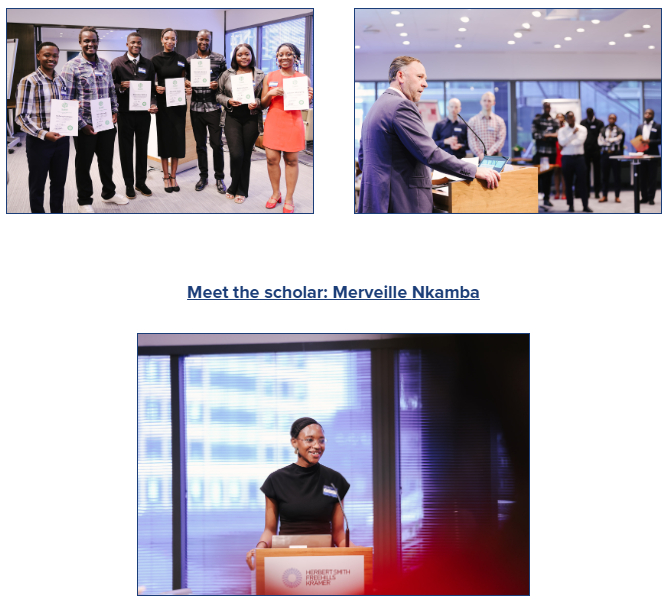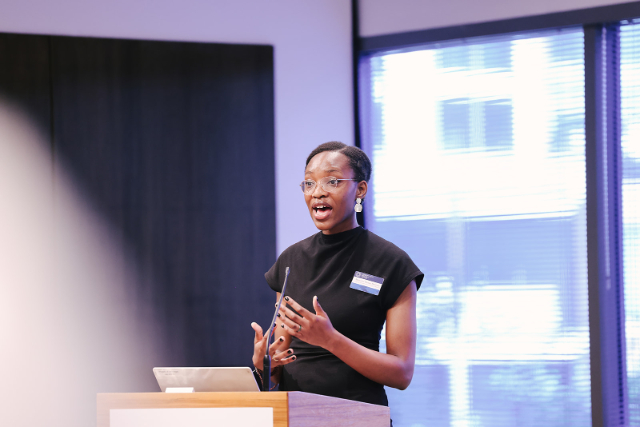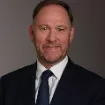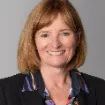- within Government and Public Sector topic(s)
- within Government, Public Sector, Transport and Environment topic(s)
Ashinaga's Africa Initiative programme enables talented, orphaned students from across sub-Saharan Africa to access higher education and leadership development training through fully funded scholarships. AAI Scholars have lost one or both parents and are committed to returning to sub-Saharan Africa to initiate change, innovation, and development. The AAI provides financial support for international university degrees, leadership training, and support to develop Scholars into compassionate change-makers.
Since it's inception in 2014, the AAI has supported incoming Scholars from 48 of the 49 sub-Saharan African countries. Selected candidates go on to study at world-class universities across Japan, Europe, the USA, and Brazil. In the UK, they are working to enable access to top UK universities, professional development and training, and the tools needed to lead community-driven change across the African continent.
We've supported the work of Ashinaga since 2019 from our London, Paris and Johannesburg offices, through volunteering, donations and pro bono support. In July we hosted an event in London to celebrate the achievements of 7 of their 2025 graduates - future leaders dedicated to building a more equitable and sustainable world and who are passionate about their communities across the African continent.

Merveille has recently graduated from Ashinaga's program and is shortly graduating from the University of Warwick. We invited Merveille to share insights from her journey, and she graciously provided the following reflections:
Tell us more about your motivations and your Ashinaga journey?
My motivations for pursuing a legal career are vast but I like to amalgamate them into one word: reconciliation. I regard the law as a restorative tool for the individual and larger society. The law can sometimes falsely be regarded as an adversarial tool of strict rules that limit individual autonomy; however, I regard it as a tool that reconciles maximum individual autonomy with interpersonal connections. No person or group exists in a vacuum.
We share the world with one another and are required to live in a state of harmony for the effectiveness of our socio-political and economic systems, or at the very least, to perpetually strive for harmony. In my view, the law is a key tool for building a bridge between people, corporations, governments, and all other groups. My motivation for pursing a legal career therefore lies in my desire to reconcile conflicting or incongruent aspects or human relations, particularly regarding business and people. My Ashinaga journey has sharpened my commitment to using the law as a tool of reconciliation through providing knowledge, skills, and the language I required to describe my goals.
The opportunity was presented to me by my mother, who often spent hours researching scholarships on my behalf because she believed in my dreams of one day becoming a successful lawyer. Upon joining Ashinaga, the financial burden of pursing tertiary education was lifted off my shoulders and I got the opportunity to attend one of the top universities in the UK. Although, my journey has had its academic and personal challenges, I graduated having learnt technical legal skills, gained legal knowledge, and had access to a network that I could have never imagined connecting with. Moreover, my Ashinaga journey has taught me understanding and intercultural sensitivity. Ashinaga scholars come from different walks of life and from many different countries, so getting to know them has enhanced my search for understanding in any given context. My Ashinaga journey has been equally personal as it has been professional and academic.
Can you tell us more about your special project, your motivations and the aim of the project?
My project titled Masculinity in Customary Law and the Constitutional Rights of Women in South Africa, was born through Ashinaga prompting me to solve an issue in my community. I endeavoured to investigate why South Africa (SA) has one of the best constitutions in the world, with the strongest gender protections, but women in SA experience some of the world's highest gender-based violence, femicide, and abuse rates in the world. An incongruency between the law and women's lived realities seemed to exist and so, I sought to find a solution to this issue.
I received assistance from the Ashinaga team in the development of my research, but I sought to pitch my research to the Undergraduate Research Support Scheme (URSS) at the University of Warwick to develop my research according to university standards. My research was authorised and funded by the URSS, and I had the opportunity to work closely with a supervisor to develop a 10,000-word dissertation on my topic.

I also had the opportunity to visit Stellenbosch University in SA where I connected with, and got to interview a customary law expert for a podcast episode that formed part of my research output. Upon completion of my project, I submitted my abstract to the British Conference of Undergraduate Research (BCUR) and the International Conference of Undergraduate Research (ICUR), both of which accepted my abstract and offered me an opportunity to present my research. I presented at BCUR in April but was unable to present at ICUR due to personal circumstances.
I am proud of my research because it was motivated by my desire to reconcile the law and women's rights in SA, as well as create understanding between genders. Moreover, my aim was to produce output that was digestible to both an academic and specialised audience as well as a non-specialised audience.
The dissertation and podcast covered both those groups. My research found that the solution to the gap between the law and women's lived realities in SA, lies in cultivating a new understanding of gender and gender relations, and thus, reconciling the law with the gendered social order. Nothing does that better than creating understanding through communication. I hope to build my podcast into a platform where communication and understanding can be cultivated with the help of expert guests.
What's next for you?
What lies ahead of me is a career in business and human rights. I am interested in trade, commerce, and all other commercial operations and their relation to human rights and environment, social, and governance (ESG). In the next five years, I project that I will be a qualified solicitor in England and Wales, have completed my master's degree in business and human rights, International Commercial and Economic law, or a similar degree, and have made progressive strides in practicing my area of interest at a firm and with clients that prioritise ESG practices.
The content of this article is intended to provide a general guide to the subject matter. Specialist advice should be sought about your specific circumstances.




